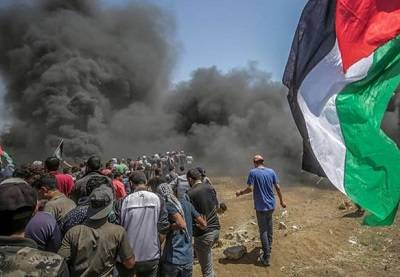Demonstrations have taken place in cities around the world in commemoration of the Nakba, or catastrophe, the day Israel was formally recognized as a state on May 15, 1948.
Tuesday's protests coincided with the killing of more than 60 Palestinians on Monday by Israel's security forces as they gathered near the Israel Gaza border.
Palestinians in the enclave had been protesting for several weeks, demanding that Palestinian refugees be granted the right to return to their ancestral lands.
About 70 percent of Gaza's population, estimated at two million, are either refugees or descendants of refugees.
Here are a few of the notable protests that took place.
Lebanon
Palestinians in Lebanon - which hosts a sizeable population of refugees - gathered in the thousands at Shkeef Fortress in the country's south to mark the 70th anniversary of the event that saw hundreds of thousands of their ancestors kicked out of their native homeland.
According to local media, defiant youth scaled down the several-hundred-metre high cliff in an attempt to reach the United Nations blue demarcation line separating Israel and Lebanon.
Reporting from the site of the protest, Al Jazeera's Zeina Khodr said the message of the march was one of defiance.
"Ismail Haniyeh, the leader of Hamas, addressed the crowd via telephone from Gaza and was very defiant, saying that resistance was the only way forward - that the Palestinian people will not surrender and will not kneel," she said.
"He also had a message for the Palestinian Authority, telling them they should abrogate the Oslo accord and not engage in any negotiations with the Israelis."
South Africa
Hundreds of protesters took to the streets of Cape Town and Johannesburg on Tuesday to denounce Israel's use of violence against unarmed protesters in Gaza.
Al Jazeera's Malcolm Webb, reporting from Johannesburg, said the plight of Palestinians resonated with many South Africans who endured racism under apartheid.
"The history of support for Palestine here in South Africa goes back many decades and its origins during the struggle against apartheid and white minority rule," said Webb.
"People here say there are a lot of similarities. A colonial settler project led to the marginalisation of the local people, their land was taken, they were deprived of their rights."
WATCH: Nakba 70 years on: Palestinians dream of returning home (2:43)
People held signs that said: "Apartheid was defeated here, it can be defeated in Israel and in the Palestinian territories."
India
Students and activists gathered in a university campus on Tuesday in the Indian capital New Delhi to commemorate Nakba.
The mood was somber as a few young men and women spoke in an open courtyard at Jawaharlal Nehru University, with Free Palestine posters and the Palestinian flag as a backdrop.
"The UN is a puppet now, it's toothless. These people are struggling for 70 years without results. The US and Israel are playing with bodies like the UN. It's a disgrace," Rizwan Ahmed, 21, told Al Jazeera.
Maphaz Ahmed Yousef, a Palestinian who lives in New Delhi with her husband and son, said she is "hopeful".
"Palestine will never lose hope in India because our shared history cannot be damaged by a government. The solidarity of Indians for Palestine means a lot. Governments will come and go, but our history cannot be erased," Yousef said.
Solidarity rallies around the world will pressure governments to limit ties with Israel.
"Besides these protests will also send a message of strength to Palestinians back home at a time when Gaza is mourning our martyrs," she adds.
Al-Jazeera


 Home
Home Discover Islam
Discover Islam Quran Recitations
Quran Recitations Lectures
Lectures
 Fatwa
Fatwa Articles
Articles Fiqh
Fiqh E-Books
E-Books Boys & Girls
Boys & Girls  Ramadan
Ramadan Fatwa Audios
Fatwa Audios Month of Mercy
Month of Mercy Women
Women Eed Al- Fitr
Eed Al- Fitr Food Recipes
Food Recipes Videos
Videos

 Prayer Times
Prayer Times












